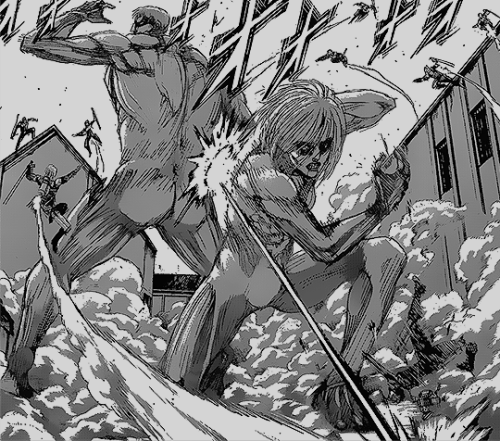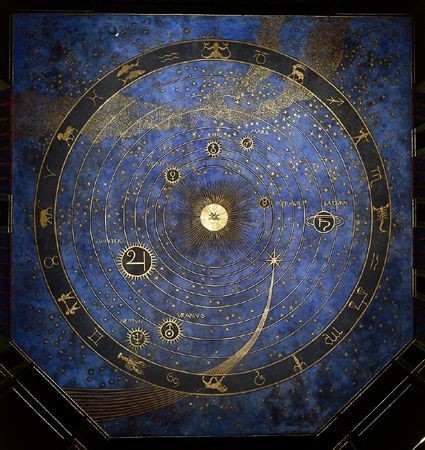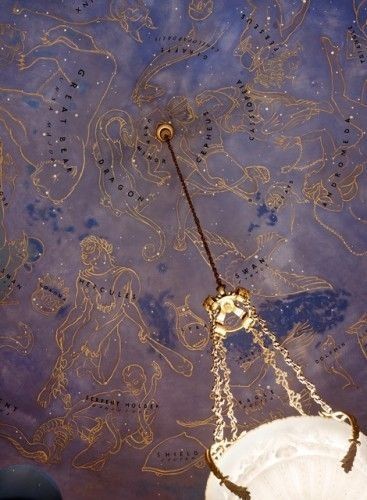The Reason Eren Sent The ST After Carla (theory)
The Reason Eren Sent the ST after Carla (theory)
In 139, it was revealed that Eren directed the Smiling Titan to where his mother was. This was not a plot twist done for shock value as it been hinted at several times in the older chapters by emphasizing on the Bert's panel and reaction as well as even including it in Eren's memory fragments through the Smiling Titan's eyes. However the chapter did not elaborate on it (like many other pressing topics, it was left behind).
Now, let's begin:

Many fans felt frustrated why this critical plot point was not addressed in the finale: why Grisha gives Eren the Founder and Attack Titans' powers despite he was horrified by the path Eren choosen and more importantly despite he told Zeke to "stop Eren".
Yes, Grisha was not on board with Eren's plan... at that point in time.
There's something changed Grisha's mind.
Just like his mind changed from submitting to the Reiss family because of his morals to murdering them in a shocking turn of events:


It's consistent with Grisha's character to switch from morally hesitating to ruthlessly and angry murdering given his goal, trauma and past failure which motivate him to complete his mission.
During the murder of the Reiss family scene, Eren was the factor in changing Grisha's mind by reminding him of all these things.
Upon seeing Eren's future memories, Grisha hesitated again. It's when he told Zeke to "stop Eren" in Eren's presence.
Zeke pulled off his memory-travel connection with Eren before they visited the fragment of the Attack Titan inheritance, therefore Eren is not able to directly influence Grisha's volatile will.
Eren on the other hand was established here to be fully focused on his goal more than saving his mother, which means his goal is something he will put ahead of her; something he will choose over her.

Eren also kept Carla's fate in the dark from Grisha.
And then, Grisha knows this:




"Eren, avenge your mother. You must. I know you can."
When Grisha found out his wife was eaten by a titan, just like how his sister was eated by dogs, because of Marely, because of this world, Grisha's morality hesitation solidified into wrath and anger again. (Grisha, after all, is very similar to Eren)
Grisha entrusted Eren to complete the mission in a parallel sense to how he burdened Zeke with saving Eldia mission. "He's my son."
In 139, Eren admitted that he wants to flatten this world because that exists in his nature, even if he doesn't understand why he just feels he has to because that is his call.
Eren sent the Smiling Titan after Carla to convince Grisha to give him the Founder's power, the power he was after from the start.
Edit: a more flattering interpretation of plot twist is that Eren, being a plot device protagonist, had written himself in the corner and felt no other choice but to follow a preset of events.
More Posts from Twilight-paradise88 and Others
Ohhhhh!!!


Source: https://www.marinabaysands.com/museum/exhibitions/attack-on-titan.html
Thank you! That was an amazing articulation of the points I brought up. Personally, I think the ideas executed in this ending are good(except how the Titan Curse ended), but the execution and tone are terrible, add that to the fact that it's pacing is off and plotlines were abandoned, and it strikes us as bad, but I think there's still quite a bit of good to be detected behind the fan-service. About Eren wanting not to be seen as a monster by his best friend, I've been thinking about that quite a bit. He did push away Armin and Mikasa but deep down he's still lonely and wants to be accepted, I think the ending could have portrayed this better by diving into the complex emotions Armin and Eren must be feeling towards each other right then. There's a lot of tension, but there's also a desire to understand and reunite and the internal conflict caused by this should have been better presented.
Critique of the Ending

After an unreasonably long wait, here are my thoughts on the ending in more detail. I’ve always tried my best to decipher the author’s reasons behind their narrative decisions instead of dismissing them off the bat if they rub me the wrong way. But, in the case of this final chapter, I can’t help but find it unworthy of all that came before it.
This critique is divided into four subsections: ‘An Irresponsible Plan’, ‘Underwhelming Heroes’, ‘Wasted Characters’, and ‘A Gimmicky Solution’. The ending launched so much new information at us that I can’t cover everything, but I have addressed those errors in plot, themes, tone, and characterisation that disappointed me most.
Keep reading
“Never let the future disturb you. You will meet it, if you have to, with the same weapons of reason which today arm you against the present.”
— Marcus Aurelius, Meditations
Analyzing Eren`s view of freedom

Concepts, ideas and philosophies are abstract phenomena which do not technically have any physical form. However people like to depict these ideas in different ways. For example the idea of justice is depicted by a goddess, who holds a scale and is blindfolded. The reason why I bring this up, is because AoT volume 33 visualizes the idea of freedom. In a beautiful yet haunting spread panel, the reader sees a young Eren high up in the sky. The sky, clouds and overall horizon seems to stretch into eternity, and at this high viewpoint there is nothing that binds Eren. In one hand this vision is Eren`s dream, the outside world that Eren dreamed about all those years ago. It is this dream among his loved one`s that Eren wishes to retain/pursue, by using the Rumbling. However since Eren describes the view as “freedom” and the person who has seen it as “the freest person in the world”, I think it encapsulates what Eren thinks freedom is. In this post I`d like to examine what this possibly means.
One mention has to be made. I have read up till volume 33 and so I do not know how the story ends. Because of this I cannot comment on some possible revelations that happen after this point. I will start the post by dissecting Eren`s vision into different elements. Then in the final portion I will go over what problems this vision has. The structure will be the following one:
- Limitless horizon and the state of nature
- Chasing a mysterious and unknown horizon
- The vision of a child – Problems with Eren`s view of freedom
- Conclusion
Limitless horizon and the state of nature
Eren`s vision of freedom is constructed from several building blocks, some more complex than others. In its basic form when one thinks about the society and world where Eren was born in, this vision is a stark contrast to that. The place Eren was born in was small, cramped and binding. As he himself tells in volume 33, from the day Eren was born those massive walls were always there. The walls obscured the horizon and made it hard to see what was past them.

They were a constant reminder of Eren`s nature as a caged being. Because of this Eren`s dream and idea of freedom has to be different from a visual perspective. Here there are no physical boundaries obscuring the horizon, and the sky stretches as far as the eye can see. The outside world is an expansive place, something that must be ten times bigger than Paradis. At this high position it is as if Eren has become the bird or obtained the wings, that have always been depicted to symbolize freedom. He can go where-ever he wants and only sky is the limit.
Keep reading
Eren and his Id: Some Further Observations
Since publishing my meta on the idea of the ‘id’ in SNK, I’ve noticed some more examples of it manifesting throughout the series.
Mikasa

What Eren attributes to Ackerman mind control is really just the nature of Mikasa’s id. She acts without seeming to realise she does so, with vacant eyes in the first panel and confusion in the last. This is just like Eren’s experience in defending Ramzi: not being mentally present in the moment, his id takes over his body like an alien and controlling force.
Keep reading
I don’t think it’s fair to characterize Eren in such a way. It should be noted that Eren’s friends had also failed on multiple occasions to show him respect by ignoring blatantly obvious sides of him. At the ocean he questions omnicide and his friends simply ignore it, at the meeting about Zeke he brings up omnicide again and his friends just pretend it didn’t happen, then in Marley he’s obviously sad, scared and disassociating at times and once again they ignore his problems. His friends and the Survey Corps were also way too open to possibilities, it’s precisely because of their idealism that they’re in this situation in the first place. Eren has definitely made mistakes in relying too much on himself, but the SC is just as guilty in their openness to possibilities and their faith in peace, Isayama says so himself, “Peace cannot be achieved by ideals alone, how many sacrifices must be made to pave the path to peace?”. So it’s wrong to characterize them as being so respectful and loving to Eren when they deliberately ignored parts of him that they didn’t want to see.
On top of this you say Eren overestimates his strength and abilities but with Reiner in the basement he tells Falco that he saved him by delivering the letter, he genuinely acknowledges that the Raid was impossible without the help of the Survey Corps, and it should be noted in the way he looks at Mikasa that he’s very emotional inside about what he has brought them to do.
And you’re disregarding the fact that he still had enough faith in his friends to entrust them with the task of stopping him, the destructive side of Eren is a side that can’t be tamed, so Eren antagonizes them later to create enough distance for them to be forced to acknowledge that side of Eren and make the decision to cut it down. He may not trust them as much as he did before, and he should have used a more tame and allied method of sublimating those desires, but at it’s core his faith in his friends still exists and Eren doesn’t overestimate himself so much as what he does is the only way he knows how to act.
Eren the Slave

There’s a common misconception in the fandom that Eren’s turn in the final arc from hero to antagonist is due to character development. This is from a belief that Eren as a character, believes in freedom and therefore has been carrying that idea on his shoulders the entire time.
There’s a confusion between the narrative which Isayama sets up for Eren which is told from a third point of view and therefore is objective, and Eren’s own personal narrative which is composed of Eren’s own personal thoughts and feelings. Basically in any story these two things will coexist and push and pull against each other, narrative the way the world sees the character and reacts to them and personal narrative the way the character sees themselves. Eren’s conception of himself is a one man army fighting for the freedom, and willing to become the enemy of the whole world in order to do it but just because a character believes that about themselves does not necessarily mean that it is true.
The following post is a discussion of Narrative Identity that is a theory that postulates individuals for an identiy by integrating their life experiences into an internalize,d evolving story of the self that provides the individual with a sense of unity and purpose in life. The narrative is a story, it has characters, episodes, imagery, a setting, plots and themes which means the events taking place in it have to have meaning.
Eren is a slave of many things, including narrative, and because of his own personal narrative he cannot change. Eren isn’t a character who has changed, moreas he’s a character we’ve had our perspective of him change as the story progresses and widens it perspective which is still development. All character development requires some kind of change or movement on the character’s part, but it doesn’t mean their characters themselves have to change, because the reader’s perspective on them can be what develops instead.
So underneath the cut: Eren’s current development is about his failure to change, which makes him the least free character in the manga. I suggest reading my Eren and Reiner meta as a precursor to this.
Keep reading
Attack on Titan The Final Season Part 2 - Official Main Trailer
Part 2 of Attack on Titan: The Final Season will premiere on January 9, 2022.
Destruction versus change


The world of AoT is entrapped within a vicious, bloody conflict. What began as a violence committed by monster with no reason behind it, has been revealed to be something much more complex and difficult. The world and its characters have been imprisoned inside a cycle of hate. This hate generates revenge and thus by the attacked person striking back, the cycle is continued into the end of eternity. The origin point of this hate that generates revenge, can be found from a bloodstained history. What makes this especially dangerous is that within this context, hate has a wide range. A painful memory or an event can be from something that happened 3 years ago, or a terrifying time period, which occurred during an almost mythological past. People draw from this past and thus are unable, or simply unwilling to forgive and look ahead.
What can the characters then do? Are they forever trapped within this bloody cycle, or is there a way for them to break free? The series presents two solutions to this problem, one shown by Eren and one shown by the Allied forces of the Survey Corps and Marley. In this post I`d like to inspect these two methods and ponder what they mean. Eren`s solution could be viewed as destruction, and the Allied forces method is change. I will start by focusing on Eren`s solution as the first section, and then in the second section inspecting the one proposed by the Allied forces.
Two quick side notes are in order before we dive into the heart of the analysis. I am aware that the manga has concluded, but I am still behind two volumes/9 chapters. I do not know how the story ends. This post has been made with the information, that has been revealed up to chapter 130/volume 32. I would also like to thank @aspoonofsugar for giving me feedback and helping with the post!
Keep reading
-
 almostluzia liked this · 11 months ago
almostluzia liked this · 11 months ago -
 takibikaen liked this · 1 year ago
takibikaen liked this · 1 year ago -
 bluegreenacker reblogged this · 1 year ago
bluegreenacker reblogged this · 1 year ago -
 dchan87 liked this · 2 years ago
dchan87 liked this · 2 years ago -
 killuasfitted liked this · 2 years ago
killuasfitted liked this · 2 years ago -
 cptbrainlag liked this · 3 years ago
cptbrainlag liked this · 3 years ago -
 kammiiiiiii liked this · 3 years ago
kammiiiiiii liked this · 3 years ago -
 vienna-fae reblogged this · 3 years ago
vienna-fae reblogged this · 3 years ago -
 clearlyholykitten liked this · 3 years ago
clearlyholykitten liked this · 3 years ago -
 bunfagam reblogged this · 3 years ago
bunfagam reblogged this · 3 years ago -
 twilight-paradise88 reblogged this · 3 years ago
twilight-paradise88 reblogged this · 3 years ago -
 randomhoe87 liked this · 3 years ago
randomhoe87 liked this · 3 years ago -
 vk--lau liked this · 3 years ago
vk--lau liked this · 3 years ago -
 sailormarzzz liked this · 3 years ago
sailormarzzz liked this · 3 years ago -
 twilight-paradise88 liked this · 3 years ago
twilight-paradise88 liked this · 3 years ago -
 savior-of-eldia reblogged this · 3 years ago
savior-of-eldia reblogged this · 3 years ago -
 hhhhhuunntteerr liked this · 3 years ago
hhhhhuunntteerr liked this · 3 years ago -
 sarcastic-straw liked this · 3 years ago
sarcastic-straw liked this · 3 years ago -
 ecrumil liked this · 3 years ago
ecrumil liked this · 3 years ago -
 lenok993 liked this · 3 years ago
lenok993 liked this · 3 years ago -
 camipretzel liked this · 3 years ago
camipretzel liked this · 3 years ago -
 wingsfreedom reblogged this · 3 years ago
wingsfreedom reblogged this · 3 years ago

"The ancient dome of heaven sheer was pricked with distant light; A star came shining white and clear, Alone above the night."
95 posts












